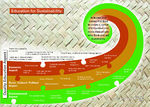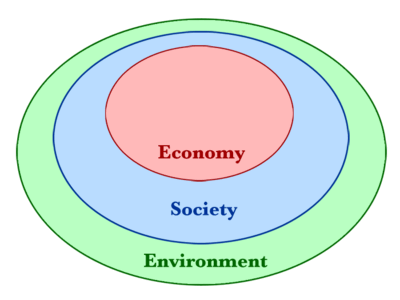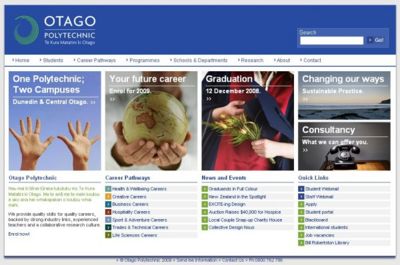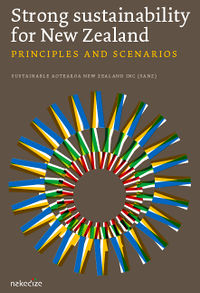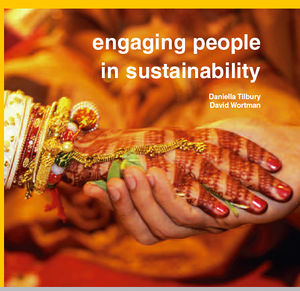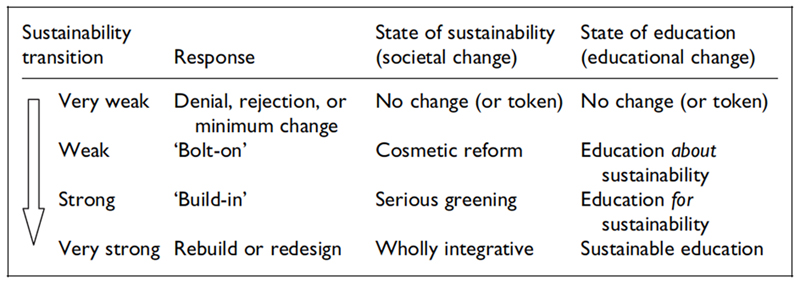Activities
Contents
- 1 SECTION ONE
- 1.1 Week 1: What does sustainability mean?
- 1.2 Week 2: What does education for sustainability mean?
- 1.3 Week 3: What does education for sustainability mean to the Otago Polytechnic?
- 1.4 Week 4: What does education for sustainability mean for New Zealand?
- 1.5 Week 5: What does education for sustainability mean internationally?
- 2 SECTION TWO
- 2.1 Week 6: How is critical thinking connected to sustainability?
- 2.2 Week 7: How is experiential learning connected to sustainability?
- 2.3 Week 8: How do you engage people in sustainability?
- 2.4 Week 9: How can you integrate sustainability into your teaching?
- 2.5 Week 10: Education for sustainability and Otago Polytechnic?
- 2.6 Final Task
SECTION ONE
This section will give you some background information on Education for Sustainability (also referred to as EfS) and it will challenge you to think about sustainability and what education for sustainability means locally and globally. This section relates to the first assessment activity, the completion of the following reflections in your learning journal can go towards the final assessment.
Week 1: What does sustainability mean?
Sustainability is a popular yet complex word that is often banded around freely, but what does it actually mean? Probably the most frequently quoted definition of sustainability is:
"Development that meets the needs of the present without compromising the ability of future generations to meet their own needs" (Brundtland, 1987)
Anna Hughes (my predecessor) compiled a comprehensive slide show of Definitions of sustainability. Also, there is an interesting article on the Top 10 Myths about Sustainability, which is great to bust some of those preconceptions. Furthermore, there a couple of online resources and documentaries that are well worth checking out to familiarize yourself with the term.
For example, see:
- The Story of Stuff a short (albeit a little patronising) animation, created by Annie Leonard
- HOME a film by Yann Arthus-Bertrand
Reference: Brundtland, G. H. (1987). Our Common Future. Oxford: Oxford University Press.
To do
1. In your learning journal, reflect upon what sustainability means to you, personally.
Week 2: What does education for sustainability mean?
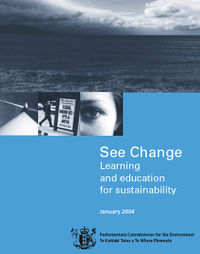
"Education for sustainability is an emerging concept that encompasses a new vision of education that seeks to empower people of all ages to assume responsibility for creating a sustainable future.” (PCE, 2004)
This publication, by the Parliamentary Commissioner for the Environment (PCE), is an informative insight into tertiary learning and education for sustainability. How does this compare to your understanding of sustainability that you explored in week 1?
You can download the most relevant chapter (chapter 3), from the PCE's publication, See Change, here (or below under Reference), which specifically explains education for sustainability. Furthermore, What is Education for? David Orr's article is an emotive piece, aimed to generate thought and reflection.
Reference: Parliamentary Commissioner for the Environment, 2004 See Change: Learning and education for sustainability
To do
2. In your learning journal reflect upon the following questions:
- How do these ideas compare to your understanding of sustainability?
- What parts of Orr's article did you agree with?
- What challenged you about the article?
- How do you apply any of Orr's ideas?
Week 3: What does education for sustainability mean to the Otago Polytechnic?
“We understand that what we teach, how we behave as an organisation and how we extend our influence into the community has an impact socially, environmentally and economically. We seek to address our responsibility to our stakeholders both through the education that we offer and our business operations.” (Otago Polytechnic)
If you are not yet familiar with the sustainability pages of Otago Polytechnic's website please go to Sustainable Practice and download and read "A Simple Pledge."
I also encourage you to have a look at the Education for Sustainability Champions Blog at the Otago Polytechnic. This is where the Sustainability Champions share how they are incorporating sustainability into their teaching across all of the departments within OP.
Additional info regarding Otago Polytechnic' Sustainable Practitioners, can be found here:
- Policy on Education for Sustainability
- OP Strategy_2008-2012
- OP Priorities
- Sustainable Operations
- Centre for Sustainable Practice
- Living Campus
- SHAC project
Reference: Birnie, C., Ellwood, K., Henry, S., Mann, D. S., & Pawlowski, I. (2008) A Simple Pledge: Towards sustainable practice. Dunedin: Otago Polytechnic.
Also: Mann, S. (2011). The Green Graduate: Educating Every Student as a Sustainable Practitioner. Wellington: NZCER Press.
To do
3. In your learning journal explore your reflections upon these explorations, including:
- How does your understanding of sustainability and education for sustainability compare to what you know about Otago Polytechnic?
- Describe what a sustainable practitioner might look like, or what characteristics they might have, within your school/department.
Week 4: What does education for sustainability mean for New Zealand?
It has been stated that “New Zealand is currently very far from being sustainable and does not have policies and practices that can achieve sustainability” (SANZ, 2009). Consider how you agree or disagree with this statement?
Sustainable Aotearoa New Zealand Inc (SANZ) and the New Zealand National Commission for UNESCO (United Nations Educational, Scientific and Cultural Organisation) outlines the notion of "strong sustainability" and what this means for New Zealand. PART 4 of the document focuses on "A scenario of a strong sustainable New Zealand".
Reference: SANZ - Sustainable Aotearoa New Zealand (2009). Strong sustainability for New Zealand: principles and scenarios: Nakedize Limited publication.
To do
4. In your learning journal reflect upon the meaning of sustainability in New Zealand, including:
- The pros and cons of "strong sustainability" for New Zealand,
- What "strong sustainability" means for your department / for the subject you teach.
Week 5: What does education for sustainability mean internationally?
It can be argued that "Education is an essential tool for achieving sustainability. People around the world recognize that current economic development trends are not sustainable and that public awareness, education and training are key to moving society toward sustainability" (Hopkins & McKeown 2000). Alternatively, other scholars argue that universities are not the place for teaching values and ethics (Fish 2008). Is it the role of education to embrace sustainability?
Reference:
- Hopkins, Charles and McKeown, Rosalyn. (2000). CHAPTER 2, Education for sustainable development: an international perspective in Tilbury, D., Fien, J., Stevenson, R.B., and Schreuder, D. (2000). Education and Sustainability: Responding to the Global Challenge
- Fish, Stanley E. (2008). Save the world on your own time. New York, NY: Oxford University Press.
To do
5. Reflect upon the changing role of education, including:
- Whether it is the role of education to address issues of sustainability,
- How the reorientation of education (according to Hopkins and McKeown's article) and the extra knowledge and skills needed to educate for sustainability, fit with Otago Polytechnics aims, visions and policies.
SECTION TWO
Section two encourages you to reflect on, critique and develop your own teaching of sustainability. You are given a number of resources and need to consider these while designing the process and content of an element of your teaching. This section relates to the second assessment activity in which you are asked to design an experiential learning activity that can enhance sustainability awareness for your students and provide them with tools to add social, environmental and economic value to your industry. This learning activity is based around one or two of your courses' learning outcomes or unit standards.
Week 6: How is critical thinking connected to sustainability?
It can be argued that “Skills such as interdisciplinary thinking, problem solving, team working, and holistic thinking are often mentioned. These skills are encompassed by the pedagogy of problem-based learning (PBL), which provides students with opportunities to learn to think, specifically ‘‘how to think’’ rather than ‘‘what to think,’’ and potentially within the framework of sustainability. Consequently, it is important to identify the commonalities of transformative learning, sustainable education and PBL" (Thomas 2009). How does this relate to your understanding of sustainability?
Reference: Reference: Thomas, I. (2009). Critical Thinking, Transformative Learning, Sustainable Education, and Problem-Based Learning in Universities. Journal of Transformative Education, 7(3), 245-264. [1].
To do
6. Reflect upon critical thinking and its role within sustainability.
Week 7: How is experiential learning connected to sustainability?
The notion of experiential learning as a teaching tool is described on the Learning and Teaching website. A basic version of the experiential learning cycle: Plan - Do - Review, is explained here: activity. How does this relate to Education for Sustainability?
An experiential learning activity must have at least these three parts to be an effective experiential learning activity as opposite to just an activity. The last section is probably the hardest to achieve, so here are a few prompts to help:
- What was the students experience of the activity?
- So what was the activity all about? What was the point in doing it? What information was often missing and what questions could not be answered? What information surprised the students? What did the students' learn from the activity? What parts of this learning do not contribute to a sustainable future?
- Now what are we going to do with this learning? How can we make a difference to the sustainability of this system?
To do
7. Plan an experiential learning activity that can enhance sustainability awareness for your students and provide them with tools to add social, environmental and economic value to your industry.
Week 8: How do you engage people in sustainability?
"You are the experts in your own lives, work and context, so use this framework as a source for inspiration, reflection and further reading. Draw upon this, the experiences and lessons of others grappling with similar issues and invest in the wealth of local knowledge and experience in your own context in order to work towards change for a better future." Kate Henderson (2004) How does Kate's statement align with your own?
CHAPTER 3 focuses on "critical thinking and reflection" and addresses topical issues regarding how to engage people in sustainability.
Reference: Henderson, K. (2004) Personal reflections p. 10 in Tilbury, D. and Wortman, D. (2004) Engaging People in Sustainability, Commission on Education and Communication, IUCN, Gland, Switzerland and Cambridge, UK.
To do
8. Reflect upon how your learning activity enhances sustainability and question whether your ideas fit within the Otago Polytechnic's aims of 'Inspiring Capability'?
Week 9: How can you integrate sustainability into your teaching?
For teachers, bringing awareness to students about social, economic and environmental issues and solutions for ethical living is important. It is also important to practice sustainably through using open resources, and sharing them with students, and collaborating on the creation of resources. They can also ensure that students develop skills for critical thinking and reflection, modeled of course by the teachers. By empowering students, teachers will be integrating approaches that sit well with social justice thinking.
- A very important questions to think about is: How can teachers ensure sustainable workloads for themselves and their students?
- By using existing open resources, and by encouraging inquiry learning' and active learning, rather than preparing masses of information and cramming it into students, is one way. Can you think of others?
''"Suppose... your government wants to combat global warming, yet is planning to develop new airports... your company wants to encourage more people to ride public transport but then builds more car park spaces... or your local school wants to promote youth leadership but excludes them from school management decision making... Why are such decisions being made?... And is there a better way to approach them?’" (Sterling 2004). Consider why such decisions are being made and what better approaches in your department/field/Otago Polytechnic could be.
Stephen Sterling asks the question of how do you make the connections and pull all of the information together to create the bigger picture, which relates directly to your objectives, he focuses on "systemic thinking" and challenges you to think systemically about your understanding of education for sustainability. How do you make these connections from you personal understandings, through to your work, the institution, the nation and even on a global scale?.
Reference: Sterling, S (2004) Thinking systemically CHAPTER 6 p.78 in Tilbury, D. and Wortman, D. (2004) Engaging People in Sustainability, Commission on Education and Communication, IUCN, Gland, Switzerland and Cambridge, UK.
To do
9. Reflect upon the meaning of systemic thinking, in particular your process of designing an experiential learning activity that enhances sustainability awareness for your students and provides them with tools to add social, environmental and economic value to your industry.
Week 10: Education for sustainability and Otago Polytechnic?
Thomas argues, "There are many contentious issues on the path to sustainability. One is how much change is required in university curricula to accommodate Education for Sustainability (EfS) and sustainable education (SE)". Reflecting on this statement and Thomas' illustration (above), how much change is required within the Otago Polytechnic to accommodate EfS?
Reference: Thomas, I. (2009). Critical Thinking, Transformative Learning, Sustainable Education, and Problem-Based Learning in Universities. Journal of Transformative Education, 7(3), 245-264. [2].
To do
10. Reflect upon your organisation's approach to sustainability, what is working, what needs improving and how can those improvements be made?
Final Task
You will be sent a link to a course evaluation form. Please comment on the value you have found in doing this course, identifying what parts have been useful to your teaching and how you think the course can be improved.
Thank you for your participation. All the best in integrating education for sustainability into your teaching and helping Otago Polytechnic achieve the goal "that every graduate may think and act as a sustainable practitioner." Please feel free to contact me for support in reaching this goal for your students. Don't forget there are plenty more resources in the 'further resources' section. Thanks again. Niki
